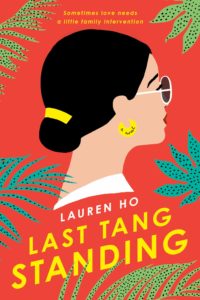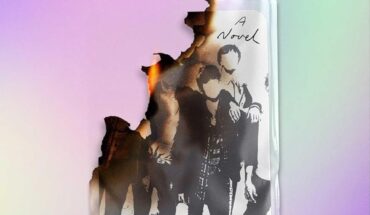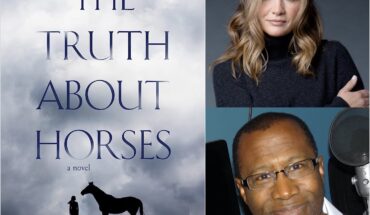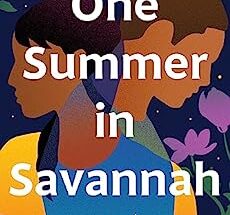 Lauren Ho’s sharp-witted debut Last Tang Standing (Putnam) opens with 33-year-old lawyer Andrea Tang attending her matriarchal aunt’s Chinese New Year party, when unmarrieds and children are given ang paos, customary red envelopes of cash symbolizing luck and happiness which are given out during auspicious occasions. At least until they–not without humiliation–age out. It is here Andrea finds out the eldest unmarried cousin of her generation in her Chinese-Malaysian clan has become engaged. Thus begins Andrea’s pursuit to find a suitable man and avoid being the last Tang standing, even as she is gunning for partnership at her law firm—something she believes would complete her life.
Lauren Ho’s sharp-witted debut Last Tang Standing (Putnam) opens with 33-year-old lawyer Andrea Tang attending her matriarchal aunt’s Chinese New Year party, when unmarrieds and children are given ang paos, customary red envelopes of cash symbolizing luck and happiness which are given out during auspicious occasions. At least until they–not without humiliation–age out. It is here Andrea finds out the eldest unmarried cousin of her generation in her Chinese-Malaysian clan has become engaged. Thus begins Andrea’s pursuit to find a suitable man and avoid being the last Tang standing, even as she is gunning for partnership at her law firm—something she believes would complete her life.
She embarks on a year’s worth of self-discovery: dating apps, Gen Z dalliances, a relationship with a much older and very wealthy man, and witty banter with her work rival. All this while vying for her highest ambition and pinnacle of achievement: equity partner at the prestigious law firm where she is an up-and-coming M&A attorney. Darkly funny and raucous, this book about familial pressure to conform, female tropes of youth and beauty, and professional desire for success is set in the world of multicultural and ultra-competitive Singapore. Yet to quote Andrea Tang: “If money wasn’t an object, what would I be?” By the end we are rooting hard for Andrea to see what has been in front of her all along, while she upends her ideas about passion, desire, money and sex. Not to mention how she defines herself as a professional, a daughter, and a woman.
Lauren, let’s start with your gift for wicked humor. From the moment of Andrea’s “Why Are You Still Single in Your Thirties, You Disappointment to Your Ancestors” inquisition by her aunt, my copy was marked up with places I laughed out loud. Do you have a background in humor or comedy, or are you just a funny person? I have a burning desire to ask if you have ever done standup, which I must admit is not something I’ve ever asked a writer.
I wish I could say I’m wickedly funny IRL, but I’m actually quite reserved and poker-faced, at least in the early days of making someone’s acquaintance. It’s only after we’ve shared some kind of bonding experience (some kind of baked good offering, for example, to me, or a few shots of tequila) that I start sharing the funny side of me. And yes, I do have a background in stand-up comedy. I was an amateur stand-up comic for two years, open-miking it in Singapore and whenever I traveled overseas till I developed the thick, thick skin that has endeared me so much to my family and skincare brands, because more money.
Did you always envision writing the book via diary entries? While it seems a simple choice, its execution is complex: you report on an event that has already happened, then drop into scene. It creates all this lovely tension (and in the wee hours of the night, humor). What were the challenges, and delights, of writing a book this way?
The diary format is great for quickly building with the reader, and it’s as close as you’ll ever get to seeing inside someone’s head, which is great when that someone is funny like Andrea. The reader gets to parse events in with Andrea’s rather distinctive voice, with her snarky, irreverent and occasionally dark humor. She quickly feels real to you.
It also felt natural to use the diary format because it’s more informal and allows me to drop the funny bits I’ve written over two years of stand-up comedy, a fertile period of time where I had ample opportunity to discuss my neuroses.
I loved your asterisks, especially to define Singlish words (for us American plebes: a modern English-based vocabulary incorporating influences from various languages and dialects spoken by the diverse local population). You were born and raised in Malaysia and lived over half your life in various countries, including the UK, France and Luxembourg before moving to Singapore with your family. How does this multiculturalism (and, I have to assume, multilingualism) affect your writing? What language do you dream in?
I’m very grateful to be a Malaysian by birth. It’s a magnificent country with such a rich tapestry of diverse faith, race and cultural heritage. To grow up embracing such diversity and to have lived abroad was instructive in shaping my sense of self, which is reflected in my writing. I strive to weave diverse perspectives into my books, as far as I am able to while serving the narrative.
Malaysia was a former British colony and English is widely used by the local population to varying degrees of fluency. My parents were educated in English-medium schools and spoke mostly English at home, along with their respective Chinese dialects, so I consider English my first language. So yes, I live and dream in English.
Nonetheless, I studied Bahasa Malaysia and Mandarin Chinese in school, so even if I don’t speak both languages on a day-to-day basis, I’m still relatively fluent in both. And I speak French with conversational fluency as I studied it and lived in Luxembourg for 5 years.
My English, and by extension my writing, is thus—and I’m borrowing Arundhati Roy’s poetic words here—“widened and deepened by the rhythms and cadences” of other tongues, due to the multilingual environments I’ve been living in most of my life.
There is a ribald honesty to Andrea’s language and thoughts about men and sex that I found wonderfully bawdy and alive. This has always been primarily male territory. Who, and what, are your favorite influences in this style?
I watch quite a bit of stand-up comedy and there are so many amazing women that have influenced me in comedy: Sarah Silverman, Joan Rivers, Ali Wong, Tina Fey, Margaret Cho, Maria Bamford, Aparna Nancherla when it comes to women in comedy. These women have always chosen to be bold and unfiltered in their brand of comedy, to push boundaries in their respective ways.
Andrea continually tries to make her pursuit for equity partner as central to her happiness, yet you describe the work as a M&A lawyer in a big corporate firm as grueling and soul crushing. How did your own experience as a lawyer contribute to your book? What was important for you to expose (with humor, of course)?
Actually I didn’t have such bad experiences working in a law firm because I wasn’t committed to pursuing partnership, but it probably mirrors the experiences of some of my seniors. I think it’s only soul-crushing if your needs aren’t being met by your work or your workplace. For many lawyers, this is a path they embark on willingly and gladly—it was the case for Andrea’s mentor, Sim Mong, anyway.
Any modern novel about “having it all” is a novel about feminism (and privilege). You do a fantastic job humorously exposing female friends and co-workers, including their obsessions and flaws. What stood out to you while exploring your different female characters and Andrea Tang’s trenchant belief in feminism?
Thank you for your compliment. This is such a good question. In writing about Andrea and her friends, I wanted readers to ask themselves what their understanding of feminism was, and to broadly showcase intersectional feminism in the context of South-East Asia, which is such a hodgepodge of diversity but which societies do tend to share certain gendered realities. Without going into a theoretical debate, I think Andrea’s main challenges in the book were as much about overcoming a lack in belief in her ability to make decisions for herself as it was about confronting gender roles in her culture as a feminist from her background.
An equally difficult subject to discuss in a soundbite is privilege, especially for an Asian cast that’s so diverse, and more importantly, based in Asia. I will say that despite its very universal themes, Last Tang Standing is inherently a book that is culturally specific to this region (Singapore and Malaysia), where the socioeconomic status of an individual—which informs privilege—is very often disproportionately affected by their race, religion, and cultural background in ways that are unique to this region. So while my book did not delve into the difficult issues pertaining to race and religion in this region, you can see glimmers of it through the cross-cultural interactions and relationships in this book. But that’s a discussion for another forum, and another day, hopefully.
I loved Andrea’s mother’s revelation at the end of the book. Speaking of endings, and twists, did you plot this novel out before you started writing? Can you tell us about your process?
The short answer is yes. The long answer is: depends on which draft you’re talking about. My process has evolved so much over the last two years. My wonderful agent Allison Hunter will tell you that the manuscript she signed up to sell is about 20% different from the manuscript she sold, and my super-chill US editor Margo Lipschultz will confirm that another 15% was changed up over 2 further revisions that we mutually agreed upon but was 70% me “trying out new ideas” (as you can tell, random percentages throw in make a statement so much more factual!). In summation I started out a pantser but now I’m 80% plotter and 20% pantser—or what is known as a “plotser” in our rarefied circles.
What was your favorite part about writing this book?
Waiting for my characters to surprise me. They become like friends by the end of the first draft, and no matter how much I think I’ve figured them out, when they decide to surprise me by throwing me a plot curve ball, I’m often pleasantly surprised—after freaking out.
What writers do you admire? What are you reading now?
Too many. Arundhati Roy, Hanya Yanagihara, Tash Aw, Li-Young Lee, Amy Hempel, George Saunders, David Sedaris, Grace Paley, Mary Gaitskill, Curtis Sittenfeld, Zhang Ailing, Ayn Rand, F. Scott Fitzgerald, Kevin Kwan, Helen Fielding, Caitlin Moran, Marian Keyes, Johnathan Franzen, and from the classics, Virginia Woolf, Thomas Hardy, D.H. Lawrence.
I’m currently reading The Stationery Shop by Marjan Kamali. But I’m excited to read several of my fellow 2020 debuts’ books, including Emily Henry’s Beach Read, Ava Homa’s Daughters of Smoke and Fire, Sajni Patel’s The Trouble With Hating You, A.H. Kim’s A Good Family, and Diane Zinna’s The All-Night Sun.
How has Covid-19 affected your publishing experience?
Well, like many others debuting this year, we were all hoping to have in-store launches and events. However I will say that the way all the stakeholders, from booksellers all the way to platforms (like Dead Darlings!), behind the scenes or not, have stepped up to keep books flowing through the hands of readers and to support 2020 debuts has humbled and cheered me to no end. And of course, if you want the industry to survive and thrive in this difficult season—please, buy books from local stores, borrow a book from your local library, or promote your fave new find online! Every bit of love our book babies get helps!
What are you working on next?
I have a few projects I’m working on: a sequel to Last Tang Standing, a mother-daughter road trip, and a dramedy related to my lockdown experience that’s probably part anger-management. Fun stuff.
LAUREN HO is a reformed legal counsel who writes funny stories. Hailing from Malaysia, she lived in the United Kingdom, France and Luxembourg before moving with her family to Singapore, where she is ostensibly working on her next novel. Last Tang Standing is not based on her mother. At all. Seriously.



